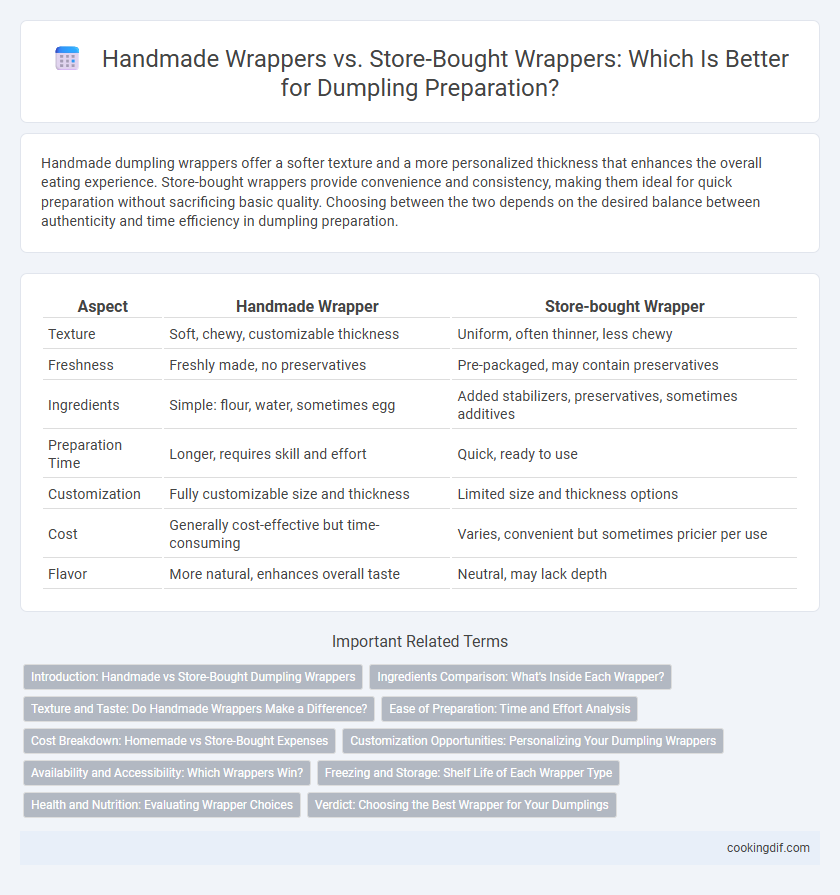Handmade dumpling wrappers offer a softer texture and a more personalized thickness that enhances the overall eating experience. Store-bought wrappers provide convenience and consistency, making them ideal for quick preparation without sacrificing basic quality. Choosing between the two depends on the desired balance between authenticity and time efficiency in dumpling preparation.
Table of Comparison
| Aspect | Handmade Wrapper | Store-bought Wrapper |
|---|---|---|
| Texture | Soft, chewy, customizable thickness | Uniform, often thinner, less chewy |
| Freshness | Freshly made, no preservatives | Pre-packaged, may contain preservatives |
| Ingredients | Simple: flour, water, sometimes egg | Added stabilizers, preservatives, sometimes additives |
| Preparation Time | Longer, requires skill and effort | Quick, ready to use |
| Customization | Fully customizable size and thickness | Limited size and thickness options |
| Cost | Generally cost-effective but time-consuming | Varies, convenient but sometimes pricier per use |
| Flavor | More natural, enhances overall taste | Neutral, may lack depth |
Introduction: Handmade vs Store-Bought Dumpling Wrappers
Handmade dumpling wrappers offer a unique texture and flavor, crafted from simple ingredients like flour, water, and sometimes egg, allowing for customization in thickness and elasticity. Store-bought wrappers provide convenience and consistency, often made with preservatives to extend shelf life and ensure uniform size. Choosing between handmade and store-bought wrappers depends on the balance of authentic taste versus preparation time and ease.
Ingredients Comparison: What's Inside Each Wrapper?
Handmade dumpling wrappers typically contain simple, natural ingredients such as wheat flour and water, offering a fresher taste and better texture. Store-bought wrappers often include preservatives and stabilizers to extend shelf life, which can affect dough elasticity and flavor. Choosing handmade wrappers allows for greater control over ingredient quality and thickness, enhancing the overall dumpling experience.
Texture and Taste: Do Handmade Wrappers Make a Difference?
Handmade dumpling wrappers offer a superior texture with a delicate chewiness and a tender bite, enhancing the overall eating experience compared to store-bought wrappers that often have a thicker, doughier consistency. The fresh dough of handmade wrappers provides a subtle, natural flavor that complements the filling, whereas store-bought wrappers may contain preservatives that slightly diminish taste and freshness. Chefs and home cooks favor handmade wrappers to achieve authentic dumplings with optimal flavor depth and a pleasing mouthfeel.
Ease of Preparation: Time and Effort Analysis
Handmade dumpling wrappers require significant time and skill, involving dough kneading, resting, and precise rolling to achieve the ideal thickness and texture. Store-bought wrappers offer a convenient alternative, drastically reducing preparation time and effort without compromising the dumpling's structural integrity. For home cooks prioritizing speed and ease, store-bought wrappers streamline the cooking process while maintaining quality.
Cost Breakdown: Homemade vs Store-Bought Expenses
Handmade dumpling wrappers require basic ingredients like flour, water, and sometimes egg, costing approximately $0.10 per wrapper, while store-bought wrappers range between $0.15 to $0.25 each depending on brand and packaging. Making wrappers at home involves upfront costs for ingredients and equipment but reduces long-term expenses with bulk preparation, whereas store-bought wrappers provide convenience at a higher recurring price. Factoring in labor and time, homemade wrappers offer significant savings for frequent cooks, while occasional users may find store-bought options more practical despite the higher per-wrapper cost.
Customization Opportunities: Personalizing Your Dumpling Wrappers
Handmade dumpling wrappers offer unparalleled customization opportunities by allowing precise control over thickness, size, and texture, enhancing the overall eating experience. Store-bought wrappers provide convenience but typically lack the ability to adjust dough elasticity and flavor according to specific recipes or dietary preferences. Tailoring wrapper characteristics by hand enables chefs to complement various fillings more effectively, resulting in a truly personalized dish.
Availability and Accessibility: Which Wrappers Win?
Handmade dumpling wrappers offer superior freshness and customization but require time and skill, making them less accessible for busy cooks. Store-bought wrappers provide widespread availability in most grocery stores, ensuring convenience and consistent quality. For quick preparation, store-bought wrappers dominate in accessibility, while handmade wrappers excel in personalized texture and taste.
Freezing and Storage: Shelf Life of Each Wrapper Type
Handmade dumpling wrappers typically have a shorter shelf life, lasting up to two days when refrigerated and up to one month when frozen due to their fresh, preservative-free ingredients. Store-bought wrappers often contain preservatives, allowing them to be stored in the freezer for up to six months without significant quality loss. Proper airtight packaging is essential for both types to prevent freezer burn and maintain optimal texture upon thawing.
Health and Nutrition: Evaluating Wrapper Choices
Handmade dumpling wrappers often contain fewer preservatives and additives compared to store-bought wrappers, providing a cleaner nutritional profile rich in natural ingredients. Store-bought wrappers may include stabilizers and emulsifiers to extend shelf life but can introduce unnecessary sodium and artificial components to the diet. Choosing handmade wrappers supports better control over ingredients, enhancing overall health benefits and reducing potential allergens.
Verdict: Choosing the Best Wrapper for Your Dumplings
Handmade dumpling wrappers offer superior texture, freshness, and customization in thickness and size, enhancing the overall eating experience. Store-bought wrappers provide convenience and consistency, saving prep time but may lack the delicate chewiness and flavor of fresh dough. For discerning cooks prioritizing quality and control, handmade wrappers are the best choice, while busy home cooks benefit from the practicality of store-bought options.
Handmade wrapper vs Store-bought wrapper for preparation Infographic

 cookingdif.com
cookingdif.com